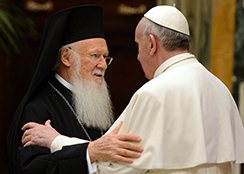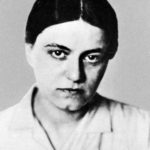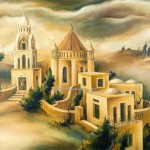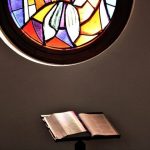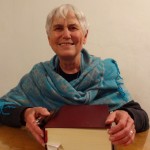The journey was begun by those “great visionaries of unity” Paul VI and Athenagoras back in 1964. Since then “we have learned to forgive one another for the mistakes and mistrust of the past; and we have taken significant steps toward rapprochement and reconciliation”. His Holiness Bartholomew i, Ecumenical Patriarch of Constantinople, and Pope Francis will continue on this path at their meeting in Jerusalem. In anticipation of the Holy Father’s visit to the Holy Land, the Patriarch spoke about the ecumenical dialogue between East and West.
Fifty years after the historic visit of Paul VI and on the cusp of Pope Francis coming to the Holy Land, what do you see before us on the path to unity?
There is no doubt that the historic meeting of our venerable predecessors, Ecumenical Patriarch Athenagoras and Pope Paul VI (who is soon to be beatified in the Roman Catholic Church), marked a new beginning for relations between Roman Catholicism and Orthodoxy.
We must remember that this event followed an entire millennium of mutual mistrust and theological estrangement between our two great traditions. Thus, despite our common history of Scripture and Tradition, both of our Churches ran the risk of damage through isolation and self-sufficiency, having followed separate ways since the eleventh century.
The meeting in Jerusalem on 5 January 1964 was an extraordinary starting-point for a long journey of reconciliation and dialogue, which the succeeding generations were called to continue. Looking back at the last 50 years, we can be grateful to God for what has been achieved both in the “dialogue of love” and in the “dialogue of truth”. The spirit of fraternal love and mutual respect has replaced the old polemic and suspicion.
At the theological level, the Joint International Commission of the Theological Dialogue of the two Churches has produced several important common documents. But we recognize that there is still a great deal to be done both between our two Churches as well as within our own Churches. There is no doubt that the path is long and difficult. But as disciples of our Lord, who prayed to His Father and urged His disciples “that they may be one” (ut unum sint: Jn 17:21), we have no other alternative but to pursue this path of reconciliation and unity. Any other way would be a dishonorable betrayal of the Lord’s will and an unacceptable return to our estranged past.
You recently said that you hope to be able to convoke a Great Council of the Orthodox Church as a sign of unity among Orthodox. Do you see this as an occasion to rediscover a kind of unity among all Christians as well?
At our most recent Assembly (Synaxis) of the Heads of the Autocephalous Orthodox Churches throughout the world, which was held at our invitation in Istanbul from 6-9 March 2014, the Primates of the Orthodox Churches deliberated on the matter of the Holy and Great Synod of the Orthodox Church and unanimously decided that, upon expediting the process of preparation, this Synod will be convened in Constantinople in 2016. This Synod will, as you observe, be a vital sign of unity among our Orthodox Churches at a time when our world demands a unified response to its critical challenges.
To read the complete interview, click here.
source: news.va
Comments
comments
